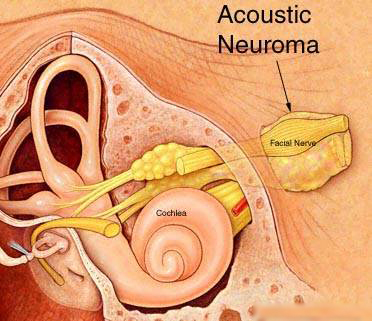Overview

Acoustic neuroma is a non-cancerous tumor that develops on the nerve that connects the ear to the brain. The tumor usually grows slowly. As it grows, it presses against the hearing and balance nerves. At first, you may have no symptoms or mild symptoms.
They can include:
- Loss of hearing on one side
- Ringing in ears
- Dizziness and balance problems
Parts Of The Body Involved :
- Ear canal
- Head
- Brain
Signs And Symptoms :
Diagnosis of an acoustic usually requires either a medical doctor with otologic expertise who can integrate together the entire picture, or an MRI with gadolinium. Because acoustic neuromas are very rare, and MRI's are very expensive, in our opinion -- all patients with a substantial risk of having an acoustic should be evaluated by a medical doctor with otologic expertise. In other words, patients with unexplained stable asymmetrical hearing loss should generally all be evaluated by a medical doctor with otologic expertise. The following text describes how this integration process can be done.
Hearing Loss
Overview - -while hearing loss is common in acoustic neuroma (i.e. it is sensitive), there are myriads of other causes of hearing loss (i.e. hearing loss is very nonspecific). Because of the high sensitivity but low specificity, routine use of a very expensive diagnostic test such as a gad-MRI of the IAC's in all persons with asymmetrical hearing is not always justified. In other words, mistakes are possible. While some clinicians "scan" all patients with asymmetrical hearing - -this is a very expensive way to "find" an acoustic.
Complications
- Brain surgery can completely remove the tumor in most cases.
- Most people with small tumors will have no permanent paralysis of the face after surgery. However, about two-thirds of patients with large tumors will have some permanent facial weakness after surgery.
- Approximately one-half of patients with small tumors will get back useful hearing in the affected ear after surgery.
- There may be delayed radiation effects after radiosurgery, including nerve damage, loss of hearing, and paralysis of the face.
Treatment
- Surgery
- Goals of surgery are to remove the tumor and prevent paralysis of the face. Preserving hearing is more difficult. If a tumor is removed when it is very small, hearing may be preserved. You cannot get back any hearing that is lost before surgery. Large tumors usually result in total loss of hearing on the affected side.
- Large tumors may also press down on nerves important for movement and feeling in the face. These tumors can typically be safely removed, but the surgery often leads to paralysis of some muscles of the face.
- Extremely large tumors may also press on the brainstem, threatening other nerves and preventing the normal flow of cerebrospinal fluid. This can lead to a build-up of fluid (hydrocephalus), which can increase pressure in the head and can be life-threatening. Goals of surgery in these cases are to treat the hydrocephalus and relieve pressure on the brainstem.
For more information, medical assessment and medical quote
as email attachment to
Email : - info@wecareindia.com
Contact Center Tel. (+91) 9029304141 (10 am. To 8 pm. IST)
(Only for international patients seeking treatment in India)










